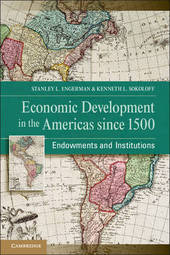
|
Economic Development in the Americas since 1500: Endowments and Institutions
Paperback / softback
Main Details
| Title |
Economic Development in the Americas since 1500: Endowments and Institutions
|
| Authors and Contributors |
By (author) Stanley L. Engerman
|
|
By (author) Kenneth L. Sokoloff
|
|
Contributions by Stephen Haber
|
|
Contributions by Elisa V. Mariscal
|
|
Contributions by Eric M. Zolt
|
| Physical Properties |
| Format:Paperback / softback | | Pages:444 | | Dimensions(mm): Height 228,Width 152 |
|
| Category/Genre | Economic history |
|---|
| ISBN/Barcode |
9780521251372
|
| Classifications | Dewey:338.9700903 |
|---|
| Audience | | Professional & Vocational | | Tertiary Education (US: College) | |
|---|
| Illustrations |
60 Tables, unspecified; 1 Halftones, unspecified; 3 Line drawings, unspecified
|
|
Publishing Details |
| Publisher |
Cambridge University Press
|
| Imprint |
Cambridge University Press
|
| Publication Date |
14 November 2011 |
| Publication Country |
United Kingdom
|
Description
This book brings together a number of previously published articles by Stanley L. Engerman and Kenneth L. Sokoloff. Its essays deal with differences in the rates of economic growth in Latin American and mainland North America, specifically the United States and Canada. It demonstrates how relative differences in growth over time are related to differences in the institutions that developed in different economies. This variation is driven by differences in major institutions - suffrage, education, tax policy, land and immigration policy, and banking and financial organizations. These factors, in turn, are all related to differences in endowments, climate and natural resources. Providing a comprehensive treatment of its topic, the essays have been revised to reflect new developments and research.
Author Biography
Stanley L. Engerman is John H. Munro Professor of Economics and Professor of History at the University of Rochester. He is the author of Slavery, Emancipation, and Freedom: Comparative Perspectives (2007), Naval Blockades in Peace and War (with Lance Davis, 2007) and Finance, Intermediaries, and Economic Development (with Philip T. Hoffman, Kenneth L. Sokoloff and Jean-Laurent Rosenthal, Cambridge University Press, 2003). He is a co-editor of the three-volume Cambridge Economic History of the United States (with Robert E. Gallman) and The Cambridge World History of Slavery (with Keith Bradley, Paul Cartledge and David Eltis). Kenneth L. Sokoloff (1952-2007) was a Professor in the Department of Economics at the University of California, Los Angeles. Among his many publications, he co-authored Human Capital and Institutions: A Long-Run View (with David Eltis and Frank D. Lewis, Cambridge University Press, 2009) and Finance, Intermediaries, and Economic Development (with Stanley L. Engerman, Philip T. Hoffman and Jean-Laurent Rosenthal, Cambridge University Press, 2003).
Reviews'This volume is both a magisterial and a profound reassessment of the role of institutions in the social, political, and economic evolution of the Americas from Columbian contact to the present. There is nothing in the literature that approaches the range and detail of the cross-country comparisons across the Americas offered by Engerman and Sokoloff and their coauthors. The broad conclusions have enormous implications for understanding the development paths of societies everywhere.' David Eltis, Robert W. Woodruff Professor of History, Emory University 'On the big question of why some countries are rich and others poor, I find myself coming back again and again to the argument at the heart of this book. Although Engerman and Sokoloff formulate it in simple terms, it is anything but simple. On the contrary, it opens up a wealth of deep ideas about the mechanisms elites use to sustain themselves in power and how these mechanisms then inhibit economic development.' Naomi R. Lamoreaux, Yale University 'The work of Engerman and Sokoloff is foundational to the literature on colonialism, institutions, and economic development and anyone interested in development or new institutional economics will need to read this book.' Tomas Nonnenmacher, EH.net
|